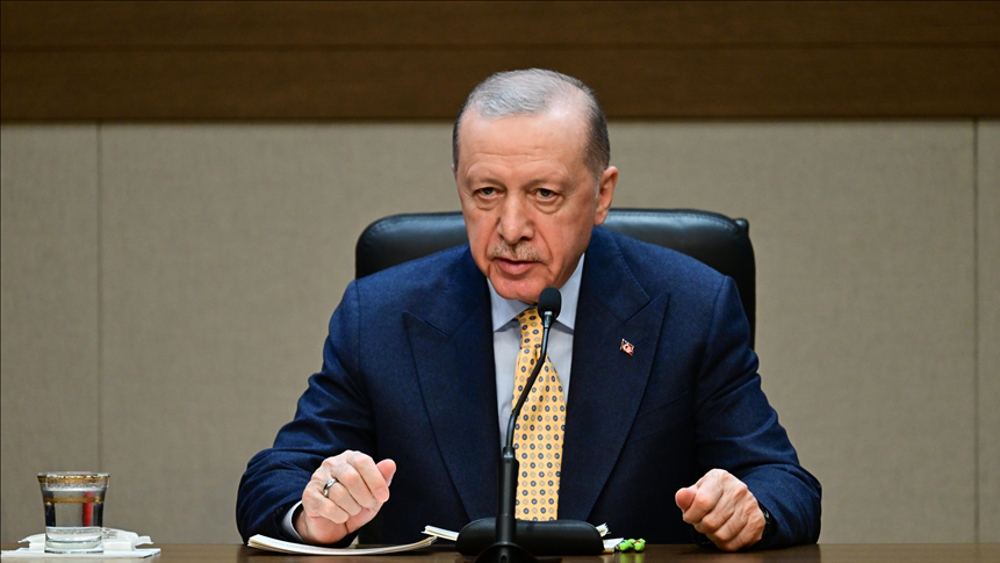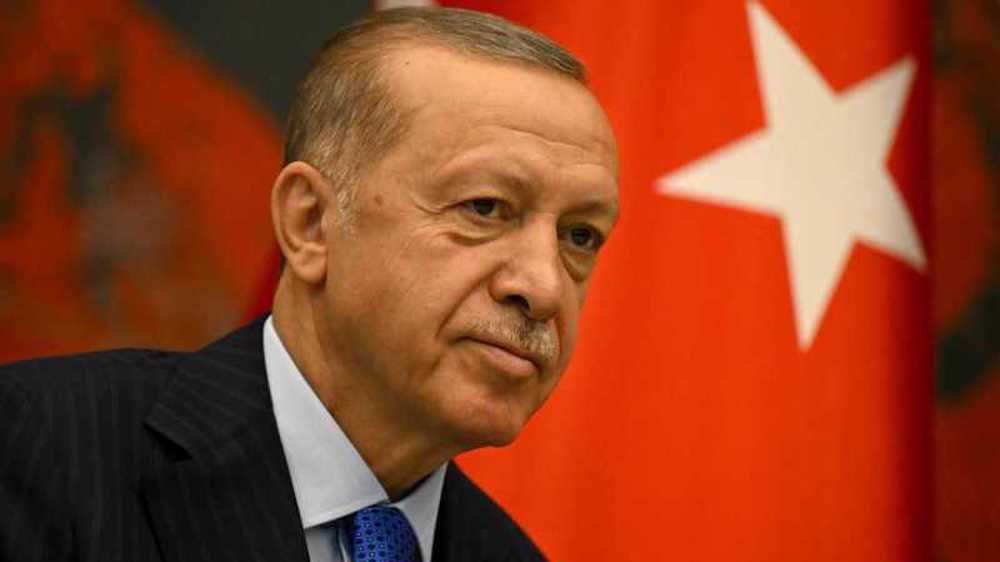Turkey's Erdogan says Putin's proposals on Ukraine grain deal being discussed
Turkish President Recep Tayyip Erdogan says a few proposals by his Russian counterpart, Vladimir Putin, on Ukraine's grain deal are being discussed, just a few days before the expiration of the vital agreement.
In remarks on Wednesday, Erdogan said that Putin had suggested a few proposals on the Black Sea grain deal, which was signed in July last year, brokered by the United Nations and Turkey, in a bid to allow Ukraine to resume exports from its southern ports, which had been blockaded by Russia since the start of the war in Ukraine in February 2022.
"Our efforts to extend the grain deal continue. We have discussed the extension of the grain deal with [Ukrainian President Volodymyr] Zelensky. He supports its extension. Also, Putin has voiced some proposals on the issue. We are making efforts to find a solution, taking into account those proposals," Erdogan said, as reported by Turkey's state news agency Anadolu.
The Turkish leader further noted that he would "continue discussing the grain deal both with Putin and Zelensky."
Russia has for long warned to exit the deal, set to expire on July 17, complaining that promises to remove obstacles to its own exports of grain and fertilizer have not been fulfilled. It has said sanctions on its payments, logistics and insurance industries have created barriers.
Last week, Russian Foreign Ministry spokeswoman Maria Zakharova once again restated Moscow's demand for its state agricultural bank to be reconnected to the global SWIFT payments system to prevent the deal from collapsing.
She also dismissed as "deliberately unworkable" a proposal reportedly put forward by the European Union that would allow Russia's Rosselkhozbank to establish a subsidiary that could connect to SWIFT, stressing that it would take many months to create such a subsidiary and another three months to connect to SWIFT.
Read more:
Zakharova further dismissed an attempt by the UN to set up an alternative payment channel between Rosselkhozbank and American bank JP Morgan (JPM.N).
"There is no real replacement for SWIFT, and cannot be," she added on July 4, stressing that it was "obvious there are no grounds" to renew the deal beyond July 17.
Nevertheless, Zakharova stressed that Russia was doing everything necessary for all ships covered by the deal to leave the Black Sea before that date.
The agreement last came up for renewal on May 18 and Russia agreed at that point to extend it for 60 more days, to July 17.
Ukraine, which is a major exporter of corn, barley, sunflower oil, and rapeseed oil, used to export most of its crop yields through its main ports on the Black and Azov Seas, but since the start of the Russian offensive, it has been forced to export by train or via its small Danube River ports.
The grain deal came with a separate agreement to facilitate shipments of Russian food and fertilizer that Moscow insists has not yet been applied. The Kremlin had initially threatened to abandon the deal if its concerns were not addressed.
UN reportedly urges Putin to extend grain deal in return for SWIFT access
UN Secretary General Antonio Guterres has proposed that if Putin extends the deal, a subsidiary of Russia's Rosselkhozbank would be connected to SWIFT, Reuters cited unnamed sources as saying on Wednesday.
The bank's SWIFT access was blocked by the European Union in June 2022 over Russia's war in Ukraine.
This while the European bloc is considering connecting to SWIFT a subsidiary of Rosselkhozbank to allow specifically for grain and fertilizer transactions, Reuters cited three unnamed sources familiar with discussions as saying on Wednesday.
The sources added that Guterres has proposed that the Russian leader allows the grain deal to continue for further several months, giving the EU time to connect a Rosselkhozbank subsidiary to SWIFT.
At a press conference on Wednesday, UN spokesman Stephane Dujarric said that Guterres had sent a letter to Putin a day earlier, proposing a way forward to further facilitate Russian food and fertilizer exports in return for the continued Black Sea shipments of Ukrainian grain.
"The objective is to remove hurdles affecting financial transactions through the Russian Agricultural Bank, a major concern expressed by the Russian Federation, and simultaneously allow for the continued flow of Ukrainian grain through the Black Sea," Dujarric added.
Moscow demands the reopening of a pipeline carrying ammonia from Russia to the Ukrainian Black Sea port of Pivdennyi for export to global markets. The Kremlin says the West has blocked the export of ammonia in violation of past deals. Ammonia is a core component of fertilizer.
More than 30 million tons of grain and agricultural products have been exported under the initiative to date. Any disruption or halt to the flow of Ukrainian grain could worsen a food crisis in the poorest countries and increase global prices.
The extension of the deal will be considered a win for countries in Africa, the Middle East and parts of Asia that are dependent on Ukrainian wheat, barley, vegetable oil and other affordable food products, particularly as drought takes a toll.

Erdogan: No power can remove Palestinians from their 'eternal' homeland

Turkey plans to establish military bases in Syria: Report

Turkey says Israeli airstrike killed three nationals on Lebanon border
Australian senator smeared by anti-Iran groups for saying Iranian women 'have a voice'
Hezbollah's display of power proved resistance cannot be eliminated: Iran parl. speaker
Israel escalates West Bank raids as official says regime seeking to complete Gaza genocide
Palestinian man dies in Israeli prison as Foreign Ministry urges intl. probe into regime’s crimes
Putin says not opposed to Europeans’ involvement in Ukraine talks
VIDEO | Iranian Kurdish protesters demand European action against PKK, PJAK terror
VIDEO | Israel expands offensive in northern West Bank, deploys tanks to Jenin
VIDEO | Spaniards fill streets of Cádiz in solidarity with Palestine







 This makes it easy to access the Press TV website
This makes it easy to access the Press TV website